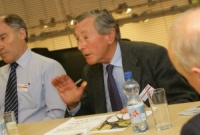Nigel Vinson
Nigel Vinson (born 27 January 1931) is a British businessman, member of the House of Lords and right-wing operative. [1] He was created a life peer as Baron Vinson of Roddam Dene in the County of Northumberland On 7 February 1985. Vinson made his fortune from the company Plastic Coatings[2] and he helped set up the Centre for Policy Studies with Keith Joseph, Alfred Sherman and Margaret Thatcher.[3]
Contents
Corporate activism and think tanks
In 1972 Vinson was a Council member of the corporate propaganda body Aims of Industry.[4] In May 1972 Vinson started the process of creating the Nigel Vinson Charitable Trust which was registered with the Charity Commission in January 1973.[5] Vinson was appointed treasurer of the Centre for Policy Studies at its foundation in 1974.[6]
In 1984 Vinson attended a meeting of Margaret Thatcher's closest advisors organised by the Centre for Policy Studies. Vinson was to be the chairman of the research on the topic of 'personal capital formation'. The overall research program was to be coordinated by Elizabeth Cottrell and it contained 18 policy groups - each with 10 members, made up from politicians, academics and businessmen. The other significant groups were:
- Trade-union reform -- chaired by Sir Leonard Neal, once an official of the transport and general workers' union, later on the British Rail board and then chairman of the commission on industrial relations under Edward Heath.
- Soviet relations -- chaired by Lord Thomas, chairman of the Centre for Policy Studies.
- Defence -- chaired by Professor Reginald Victor Jones of the University of Aberdeen, who wrote the definitive account of Britain's wartime secret "Ultra" decoder.
- Urban and housing problems -- chaired by Mr Jimmy James of Grosvenor Estates. It is concentrating on revival of the private rented sector.
- Education -- chaired by Baroness Cox, another academic and a strong supporter of selective rather than comprehensive education.
- Deregulation -- chaired by Mr Russell Lewis of the Daily Telegraph.[7]
Views and activities
Pensions
In April 1983, the Centre for Policy Studies published a pamphlet by Vinson, then a deputy chairman of Barclays Bank. Entitled Personal and Portable Pensions for All, it challenged the role of workplace pensions. The concept of personal pensions was taken up by the Conservative Government's review group in the face of opposition from the Labour Party, which argued that they would lead to mis-selling and many would end up worse off.[8]
Rural Development
In 1984 Vinson was the chairman of the Development Commission, 'England's rural development agancy'.[9]
Euroscepticism
On the subject of Europe Vinson argues that 'Without serious debate, we shall have so stretched the democratic elastic that it will surely snap. Like the French lorry-drivers, people may resort to taking the law into their own hands. It is precisely because Eurosceptics like myself seek peace coupled with prosperity that we are fearful of the consequences of a fully federated Europe'.[10]
Affiliations
- Civitas, Trustee | Nigel Vinson Charitable Trust | Taxpayers' Alliance, 'Business supporter'[11] | Global Vision, 'supporter' | Aims of Industry Council member 1972[4] | HS2 Cannot be Justified |
External Resources
- TheyWorkForYou Lord Vinson
Notes
- ↑ Margaret Thatcher & the Centre for Policy Studies, 1974-79, Margaret Thatcher Foundation, accessed 21 April 2010.
- ↑ Michael Gillard And David Leigh, TORY PARTY DONORS LINE UP FOR SELL-OFF BARGAINS, The Observer, 4-August-1996
- ↑ Keith Joseph, Our debt to a slayer of sacred cows, The Times, 25-March-1992
- ↑ 4.0 4.1 Aims of Industry 30 years of Aims of Industry London: Aims of Industry 1972.
- ↑ Charity Commission Charity Framework, accessed 5 May 2011.
- ↑ Margaret Thatcher & the Centre for Policy Studies, 1974-79, Margaret Thatcher Foundation, accessed 21 April 2010.
- ↑ World Politics, Mrs Thatcher starts to plan for her third term, The Economist, 21-January-1984
- ↑ Nic Cicutti, The great pensions scandal: When you get to their age, you may not have enough to live on. Nick Cicutti investigates. . ., Sunday Independent, 22 May 1994.
- ↑ Rural Development, Financial Signpost / Rural development, the Guardian, 26-October-1984
- ↑ Nigel Vinson, CBI challenged on its EMU policy, The Times, 15-November-1997
- ↑ Taxpayers' alliance Prominent supporters, Accessed 18 November 2010
